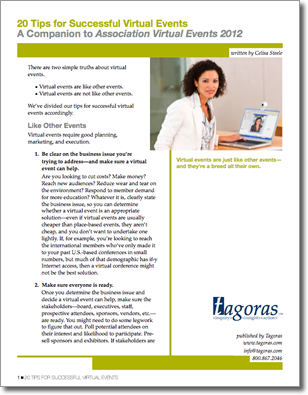
Next week we’ll release our new Association Virtual Events report. This week we’re reissuing a free (as in no money, no name, no nothing required—just download it) companion to that report: “20 Tips for a Successful Virtual Event.”
If you’re interested in virtual events, whether your association is already offering them or just considering offering its first, we encourage you to sign up for the Tagoras Research Community. We’ll announce the release of the Association Virtual Events report first to that community next week—and offer discounts, including a limited-time 100-percent-off option.
For now, enjoy a couple of the tips we offer up in the free resource “20 Tips for a Successful Virtual Event.” The tips, by the way, are based on input from our surveys and from discussions with virtual event technology providers and with a wide range of associations that have offered virtual events.
Be Clear on Your Business Issues
You have to make sure a virtual event can help with your business issues—which means you need to state them explicitly.
- Are you looking to cut costs?
- Make money?
- Reach new audiences?
- Reduce wear and tear on the environment?
- Respond to member demand for more education?
Whatever it is, clearly state the business issue, so you can determine whether a virtual event is an appropriate solution—even if virtual events are usually cheaper than place-based events, they aren’t cheap, and you don’t want to undertake one lightly.
If, for example, you’re looking to reach the international members who’ve only made it to your past U.S.-based conferences in small numbers, but much of that demographic has if-y Internet access, then a virtual conference might not be the best solution.
Educate—Almost Ad Nauseam
Because so many stakeholders may be new to virtual events, plan to spend significant time explaining what one is and holding hands. Give staff, potential sponsors and vendors, presenters, even attendees access to the environment or a demo, so they can see the platform and get comfortable with it.
Folks will be more likely to pay—whether for a big-ticket sponsorship or a simple registration—if they can see for themselves what the virtual event will be like. Provide training and create videos and demos to show attendees, speakers, and sponsors how to navigate and get the most out of the event. There are plenty of relatively low-cost screen-casting tools like Jing that can be used for creating a simple video tour of your event.
Spell out the benefits of going virtual to sponsors—for example, they can get information about even casual booth visitors who would likely remain anonymous at a “real” event.
More Tips for Successful Virtual Events
Those are just two of the twenty tips in the free resource, so be sure to download your free copy of “20 Tips for Successful Virtual Events.”
And if you have tips and suggestions for successful virtual events, we’d love for you to share them with us and others—you can leave them in a comment below.
Celisa

Leave a Reply